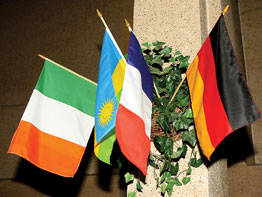BALTIMORE – With at least 42 different nations represented in the congregation of St. Matthew, Bishop Denis J. Madden, urban vicar, wants the pastor of the Baltimore parish to share how he cultivated his multicultural ministry.
“I want people to be aware of the unique qualities in this parish and the acceptance that people from so many different countries feel there,” Bishop Madden said. “There is an instant quality of welcoming at St. Matthew’s which goes beyond the liturgy. The parish reaches out to those in need of health care, employment and help with immigration matters.”
The parish’s multicultural ministry evolution began with the 1990 appointment of Father Joseph L. Muth Jr. as pastor of St. Matthew.
Soon after his appointment, Father Muth noticed a small group of Africans from various nations in the congregation, but he quickly discovered they did not take part in the parish’s social functions.
After making inquiries, the Baltimore-born priest learned the newly arrived Africans didn’t understand that a picnic or bull roast equaled a social gathering. Nor did they understand they were invited.
“It dawned on me that there was a communication problem because we didn’t fully understand one another’s cultures,” Father Muth said. “We had to figure out how to explain these things so that everyone understood. It was the only way we were going to be able to make them feel welcomed in our community.”
Through trial and error, the pastor and staff discovered they had to be very specific with the immigrants about things ingrained in American popular culture, such as what it means to bring “finger foods” to a social gathering.
“I also found out that fliers and the bulletin didn’t work to reach them,” Father Muth said. “I had to make announcements at Mass and personally tell them, ‘Hey, we want you to be with us.’“
He also encouraged the immigrants to serve on the parish council and to attend the official meetings.
As St. Matthew gained a reputation of acceptance by the mid 1990s, the new immigrant population at the parish – particularly Kenyans, Nigerians, Sudanese and Rwandans – began to grow. So did the requests for help with immigration issues.
At first Father Muth helped parishioners from Nepal, the Philippines and other nations apply for green cards, status adjustments and political asylum. He even loaned them money to fly family members to the country once the government approved their passage.
Eventually the workload became too much for the pastor alone, so the parish established an immigration center in 2000. With a $150,000 annual budget, it now employs a full-time director, a part-time immigration attorney, a part-time accountant and a slew of volunteers.
Last year the center fielded 1,545 inquiries, made countless referrals to various immigration agencies and helped 371 immigrants from 51 different countries with various legal issues, said Oti Nwosu, a Nigerian-born immigration attorney for the center.
The center’s budget comes from grant money and donations, including an annual fundraising gala, held this year at the Baltimore Museum of Art. In past years the event has raised as much as $50,000, Father Muth said.
In addition to the immigration center, the parish has a monthly Mass in the Nigerian language of Igbo and a Mass every other month in Swahili. The flags of 42 different nations hang in the church to give members of the congregation a sense of belonging, he said.
“This parish is a great example of how we as Catholics can help people new to our country integrate into our culture,” Bishop Madden said.
“They have welcomed them into their community and accepted and respected their culture as well. It’s a thoughtful and prayerful expression of the love for God,” he said.
